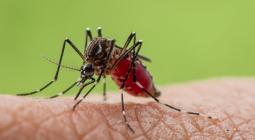Ross River virus: more than 1,500 cases recorded in Queensland as mosquito numbers spike
Easter long weekend campers warned to cover up to avoid bites, with cases also recorded in NSW and Victoria
Holidaymakers planning to head to the regions this Easter long weekend have been warned to cover up to avoid mosquito bites as Ross River virus cases surge, with more than 1,500 cases recorded in Queensland alone.
Nine per cent of mosquito traps in Queensland, most of which were located in the state’s south-east, have tested positive for the virus, which causes swollen and painful joints, fever and rash.
The virus is spread from mosquitoes to humans but can’t be transmitted from person to person. People usually recover a few weeks after the initial infection but some can experience symptoms for months.
Dr Stephen Conaty from New South Wales Health said warm and wet conditions meant “significant numbers” of mosquitos were also expected in NSW over the next several weeks, particularly in the state’s north.
“Easter can be a busy time with people travelling around NSW to visit family or friends, spending time outdoors and engaging in activities like camping,” Conaty said.
“There is no specific treatment for these viruses. The best way to avoid infection is to avoid being bitten by mosquitoes.”
As of Wednesday there have been 1,562 recorded Ross River virus in cases Queensland since 1 January and 125 cases in NSW this year. Victoria has recored eight cases between 1 January and 3 March.
Queensland’s chief health officer, Dr John Gerrard, said Ross River virus infections usually began to rise with the onset of rainy and warm weather in December and peaked in February and March.
“It is also typical to see a significant number of Ross River virus cases every three to four years, so we are on track for a spike in cases,” Gerrard said.
There were more than 3,000 confirmed cases in the state in the last big surge in 2020.
A Queensland Health spokesperson said the state’s infections may remain high during April and May but there was normally a reduction during cooler months.
Health authorities have recommended that people in mosquito-prone areas regularly apply insect repellent that contains DEET, picaridin or lemon eucalyptus oil; wear clothing to cover up their arms, legs and feet; and avoid going outside at dawn or dusk when mosquitoes are most active.
Containers holding standing water around homes should also be emptied where possible.
Assoc Prof Francesca Frentiu from the Queensland University of Technology said above average temperatures and rainfall had contributed to surges in mosquito-borne viruses but the risk of infection was highly dependent on local conditions.
“Because of the complexity of how the virus is transmitted, it’s not always clear what the primary driver of infections are,” Frentiu said.
“Generally if we’ve got lots of virus transmission among hosts – usually marsupials, birds and livestock, which mosquitoes then bite and contract the virus themselves – then that tends to spill over into human transmission as well.”
Proximity to stagnant bodies of water where mosquitos breed also played a role, Frentiu said.
Rising temperatures due to global heating will cause a long-term increase in mosquito-borne virus infections.
“We’re going to get longer [mosquito] seasons,” she said. “They will be active for a lot longer in the year.”
Cover photo: Queensland has recorded a surge in cases of Ross River virus, which is spread by mosquitos and causes painful joints, fever and rash. Photograph: RolfAasa/Getty Images





